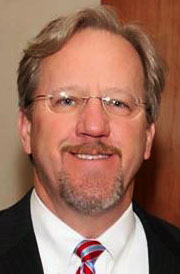
Village Bank, headquartered on Midlothian Turnpike, has closed its stock offering. Photo courtesy of CBRE.
Surpassing its goal by $2.5 million, Midlothian-based Village Bank has succeeded in raising some much-needed capital.
The bank and its parent company, Village Bank and Trust Financial Corp., announced Friday the completion of a stock offering that brought in more than $14.5 million from current shareholders and a Northern Virginia investor.
Village CEO Bill Foster said the result is a welcome cushion of capital that the bank can now use to meet its obligations with regulators and execute its strategies for growth.
“We feel like we’ve got the capital we need to both meet the regulatory requirements in the agreements we’ve got, and then to grow the company after that for a long period of time,” Foster said. “So it’s good. We raised more capital than we needed to, because we wanted to support the growth of the business.”
The offering gave shareholders the chance to buy common stock before Northern Virginia bank investor and former SEC attorney Kenneth R. Lehman purchased $8 million worth of shares, giving him a 41 percent stake.
The bank ultimately issued an aggregate of just more than 1 million shares of common stock at $13.87 per share, producing aggregate gross proceeds of $14.58 million. The offering ran from Feb. 10 through March 20.
The plan, which the company announced last November, initially aimed to raise $12 million, Foster said. But later investments by existing shareholders, who were given the chance to purchase additional shares after Lehman, brought the total capital raised to just more than $14.5 million.
Prior to Lehman’s purchases, shareholders were given the opportunity to purchase three shares of common stock for each share they already owned. Oversubscription shares – meaning those purchased after Lehman bought his stake in the company – totaled 36.9 percent of the total shares purchased. The offering issued 283,293 shares to shareholders through their basic subscription rights, and 191,773 shares in oversubscription privileges.
“The response rate we had for people exercising their basic rights was great, and then we were vastly oversubscribed by existing shareholders who wanted to buy more than their guaranteed number of shares,” Foster said.
Lehman, who owned preferred stock in Village before the offering, purchased an aggregate of 576,800 shares of Village common stock, 333,007 of which were issued in exchange for 9,023 shares of preferred stock. The remaining shares were purchased for cash.
Three years ago, Lehman bought into Glen Allen-based First Capital Bank through a similar standby purchase agreement. He ended up owning a 48 percent stake of First Capital, according to a company proxy. His agreement with Village capped his potential stake at 49 percent; he now owns 41 percent.
The raised capital allows Village to shed the last of its leftover baggage from the recession, which has left the bank in a sort of holding pattern due to lingering high levels of bad loans and foreclosed real estate. It will also help the bank stay in compliance with stringent regulatory agreements the bank has been under for several years.
Foster said the bank now has its sights set on growing its mortgage business, as well as its commercial and consumer banking business.
This was Village’s first capital raise by way of a standby rights offering. The bank previously raised a combined $1.68 million in a private placement in 2013.
“Simply the fact that we had subscribed by more than $4.5 million was very encouraging and exciting, that we got that reception out there,” Foster said. “And it was largely from local, longtime investors – people who do business with us, employees of the company – that really stepped up and responded favorably.”

Village Bank, headquartered on Midlothian Turnpike, has closed its stock offering. Photo courtesy of CBRE.
Surpassing its goal by $2.5 million, Midlothian-based Village Bank has succeeded in raising some much-needed capital.
The bank and its parent company, Village Bank and Trust Financial Corp., announced Friday the completion of a stock offering that brought in more than $14.5 million from current shareholders and a Northern Virginia investor.
Village CEO Bill Foster said the result is a welcome cushion of capital that the bank can now use to meet its obligations with regulators and execute its strategies for growth.
“We feel like we’ve got the capital we need to both meet the regulatory requirements in the agreements we’ve got, and then to grow the company after that for a long period of time,” Foster said. “So it’s good. We raised more capital than we needed to, because we wanted to support the growth of the business.”
The offering gave shareholders the chance to buy common stock before Northern Virginia bank investor and former SEC attorney Kenneth R. Lehman purchased $8 million worth of shares, giving him a 41 percent stake.
The bank ultimately issued an aggregate of just more than 1 million shares of common stock at $13.87 per share, producing aggregate gross proceeds of $14.58 million. The offering ran from Feb. 10 through March 20.
The plan, which the company announced last November, initially aimed to raise $12 million, Foster said. But later investments by existing shareholders, who were given the chance to purchase additional shares after Lehman, brought the total capital raised to just more than $14.5 million.
Prior to Lehman’s purchases, shareholders were given the opportunity to purchase three shares of common stock for each share they already owned. Oversubscription shares – meaning those purchased after Lehman bought his stake in the company – totaled 36.9 percent of the total shares purchased. The offering issued 283,293 shares to shareholders through their basic subscription rights, and 191,773 shares in oversubscription privileges.
“The response rate we had for people exercising their basic rights was great, and then we were vastly oversubscribed by existing shareholders who wanted to buy more than their guaranteed number of shares,” Foster said.
Lehman, who owned preferred stock in Village before the offering, purchased an aggregate of 576,800 shares of Village common stock, 333,007 of which were issued in exchange for 9,023 shares of preferred stock. The remaining shares were purchased for cash.
Three years ago, Lehman bought into Glen Allen-based First Capital Bank through a similar standby purchase agreement. He ended up owning a 48 percent stake of First Capital, according to a company proxy. His agreement with Village capped his potential stake at 49 percent; he now owns 41 percent.
The raised capital allows Village to shed the last of its leftover baggage from the recession, which has left the bank in a sort of holding pattern due to lingering high levels of bad loans and foreclosed real estate. It will also help the bank stay in compliance with stringent regulatory agreements the bank has been under for several years.
Foster said the bank now has its sights set on growing its mortgage business, as well as its commercial and consumer banking business.
This was Village’s first capital raise by way of a standby rights offering. The bank previously raised a combined $1.68 million in a private placement in 2013.
“Simply the fact that we had subscribed by more than $4.5 million was very encouraging and exciting, that we got that reception out there,” Foster said. “And it was largely from local, longtime investors – people who do business with us, employees of the company – that really stepped up and responded favorably.”



